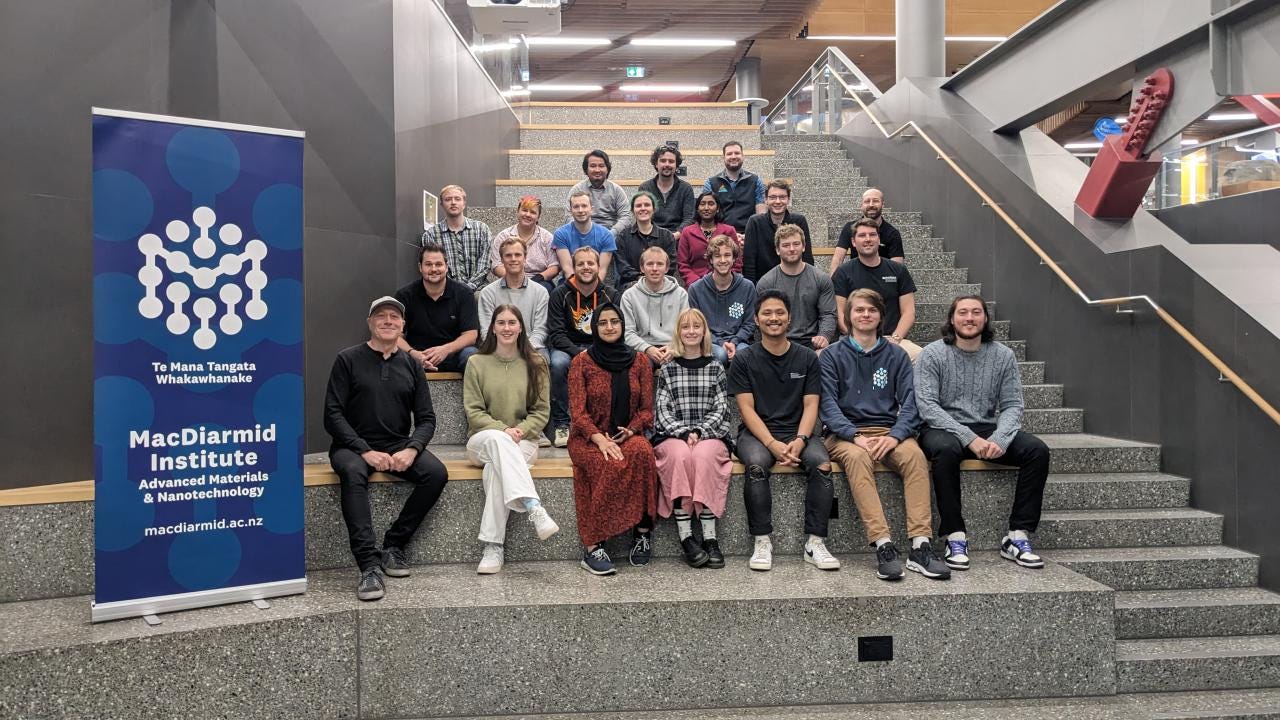⏩Fast Forward Aotearoa #45: 🛳️🛳️two ships from Korea✈️✈️two planes to China🤝back to foreign policy basics🌐repositioning for NATO+🐇🕳️the election games begin🛑avoiding technopolar hegemony
The Indo-Pacific 4
Kia ora and welcome to ⏩Fast Forward Aotearoa, my intermittent newsletter and book-in-progress thinking about emerging tech and the unfolding future in my corner of the world, Aotearoa New Zealand. Thanks for reading!
(TIP: If you want to keep receiving the weekly Wednesday Memia emerging tech newsletter but prefer not receive these Aotearoa-focused posts you can manage your subscription preferences here.)
Aotearoa roundup
Catching up on two weeks of developments… lots happening — in particular some major developments in trade and foreign policy after a long intermission.
🛳️🛳️Two ships from Korea
Firstly, I’ve been travelling this week, taking the Interislander ferry across from Waitohi to Te Whanganui-a-Tara and back again. Less bumpy than last time… I was rather excited to find out more about the two new hybrid-electric ferries on order from South Korea which are due to come into service in 2025-2026 — the first new ferries purchased since the Aratere in 1999. (Aotearoa *can* do infrastructure??!🤯)
Of particular note: the hybrid engines will reduce ferry fleet emissions by approximately 40 per cent from day one (and more from there as alternative biofuel sources are found) plus they will run on battery entering and departing harbours in normal weather conditions, reducing noise and, in theory, marine disturbances. More info here:
✈️✈️Two planes to China
PM Chris Hipkins led a business delegation to China two weeks ago, re-establishing the formerly well-trodden trade bridge between the two countries before Covid. By all accounts a successfully executed trip, continuing to assert Aotearoa’s “independent foreign policy” intentions (eg. keep on tightrope walking in between US and Chinese spheres of influence…)
Hipkins got an in-person sitdown and handshake from Xi himself… who described Aotearoa as “a friend and a partner”. Despite infinite prodding from media to make the trip about human rights and China/US geopolitical flexing, the PM mostly kept his powder dry, extending as far as “a warm relationship and warm conversation” in his comments, but not much more.
There was clearly a concerted campaign to keep the coverage focused on trade agreements, not geopolitical and human rights disagreements, despite a story leaking that foreign minister Nanaia Mahuta was “harangued” for an hour in a March sit-down with Chinese opposite number Qian Gang.
As for the trade delegation itself… CEO of the New Zealand Story initiative David Downs dropped some informative daily diaries to LinkedIn which gave an intimate (if uncontroversial) feel of the trip…
One new aspect of the trip was a stronger emphasis on Aotearoa’s indigenous Māori culture during the trip - Te Matatini champions Te Kapa Haka o Te Whānau-ā-Apanui accompanying the trip along the way including a performance on the Great Wall which went all across Chinese social media:
(At the same time, almost all of the trade deals focused on Pākehā-dominated primary industries including red meat, kiwifruit and dairy… don’t mention cultural appropriation…)
The PM’s stated intention to “throw support behind emerging sectors such as gaming and health and wellness” didn’t really seem to lead to much either. Except perhaps to sheet home the massive capability gap and compatibility challenges with the very different Chinese tech ecosystem. Peter Griffin summarises the reality: China is worlds away for our tech exporters.
(Specific research to explore and catalogue the tech ecosystems in key markets around the world would be a great project for NZTE…)
Local popular media focused on the *important* issues as usual🤦 - why did they take a second plane in case the first one broke down? (The airforce Boeing 757s in question are 30 years old and not due for replacement until 2028-2030…allegedly with a NZ$600M pricetag).
Compare that to the potential pricetag of joining AUKUS Pillar 2 (see next)… perhaps NZ$1Bn on planes used for trade diplomacy is a lot more value for money than many more billions spent on unspecified “artificial intelligence (AI), quantum computing, cyber, undersea capabilities, hypersonic weapons, information-sharing and electronic warfare.”
🤝Getting back to foreign policy basics
Immediately after returning from China, the PM gave a wide-ranging “back to basics” Foreign Policy speech in Wellington covering Aotearoa’s relationships with (in order) Australia, the US, UK & Europe, the Pacific and China in an increasingly complex and uncertain world. It also included this passage on emerging cyber and disinformation threats:
“As we scan the international horizon, we need to keep our eyes wide open to the emerging issues and threats to New Zealand and our interests.
Cyber actors, some of whom are state-sponsored, are increasingly emboldened.
They are targeting critical infrastructure, government networks and large companies - including in New Zealand – for financial and strategic gain.
The disruptive impacts of malicious cyber activities targeting information systems and telecommunication networks is growing, with real impacts for New Zealanders.
Disinformation is on the rise around the world, and will continue to pose ongoing threats to democracy and social cohesion.
Here in New Zealand, we have experienced how disinformation from international sources can find a niche and amplify divisions and foment unrest.
But … I’m not convinced these emerging threats require an entirely new foreign policy response.
In fact, I believe our independent position, coupled with stronger ties with partners and allies puts us in a strong position to face the future.”
Read into that what you will…
“A good example is the Christchurch Call.
The Call leveraged our position as an honest broker on the world stage to draw together a coalition of countries, tech companies and civil society to address the issue of terrorist and violent extremist content online.
…I see this as a role New Zealand can and should play regularly.
Be it on climate alongside our Pacific neighbours.
On fair global trade rules alongside other smaller nations that rely on key multilateral institutions to provide a fair and level playing field.
Or at the International Court of Justice and the International Criminal Court seeking justice for Ukraine.
The stability, certainty and largely bipartisan approach to our foreign policy continues to be our greatest asset in addressing the emerging global threatscape.“
It may be that “honest broker” is actually seen as a highly valuable strategic function internationally… and comes with a degree of tacit protection from all sides…
Full writeup from RNZ here. A few other key points mentioned in the speech:
A coordinated refresh spanning national security, defence, and foreign policy, including Aotearoa’s first ever (!?) National Security Strategy.
Reiteration that Aotearoa will not be taking part in AUKUS nuclear submarine section (… but still leaving the door open to “Pillar 2”…but with no mention about policy on autonomous weapons).
🌐Repositioning for NATO+ (“IP4”)?
The PM then promptly took off again (only one plane this time?) heading for Europe to sign off on a long-negotiated trade deal with the EU and then attend on the sidelines of this week’s NATO summit in Lithuania.
If anything, the last two weeks’ choreographed diplomacy and policy statements provide a clearer position on Aotearoa’s continued independent strategic alignment…but there are still fundamental questions unanswered. A pick of the commentary:
Washington Post: New Zealand’s bind: Balancing Western security against Chinese trade quotes foreign policy analyst Te Herenga Waka / Victoria University of Wellington Van Jackson:
“New Zealand is part of the regional [Indo-Pacific] architecture. But that’s different from actually having a strategy ...Does this foreign policy choice heighten the forces of rivalry? Does it does it heighten a new Cold War or does it lessen those things? Does it increase autonomy for smaller states? Those kinds of questions are not being asked.”
Breaking Defense from May: New Zealand in AUKUS? The political Kiwi conundrum over Pillar 2 membership quotes from an interview with Anna Powles, senior lecturer at the Centre for Defence and Security Studies at Te Kunenga ki Pūrehuroa / Massey University:
“…Pillar 2 is “scant on details” and until there is more information about what is included in this part of AUKUS it is difficult to know if it makes sense for New Zealand to join….[New Zealand has] “fought very strongly in recent years to be seen as very much as part of the Asia-Pacific, not as an Anglo-antipodean outpost.” … so far New Zealand has been “very good at managing a policy of strategic ambiguity to a degree in the way that it has hedged and balanced its relationships between China and the US” but joining AUKUS would be picking a side...“you can’t have one foot in and one foot out.”
Te Whare Wānanga o Ōtākou / University of Otago’s Robert Patman discussed the foreign policy speech on Friday’s The Hoon1 podcast with Bernard Hickey and Peter Bale, emphasising the significance of Hipkins reasserting Aotearoa’s “independent foreign policy”.
Most interesting, Democracy Project geopolitical analyst Geoffrey Miller wrote about an expected announcement of Aotearoa’s participation in a new “NATO+” arrangement this week including three other Indo-Pacific democracies: New Zealand gets ready to embrace NATO:
“Instead of NATO+, the more arcane ‘IP4’ nomenclature looks set to be used by the summit’s joint statement issued in Vilnius, a reference to the four NATO-friendly countries in the Indo-Pacific (or ‘IP’): Australia, Japan, New Zealand and South Korea.“
Time to build consensus at home
With a closely-contested general election happening here later this year, personally I’m not expecting any further major foreign policy announcements from here on. And with the US about to be sucked into the all-consuming vortex of their 2024 Presidential election, it’s perhaps likely that US-China relations will remain in a kind of stasis for the foreseeable as well, particularly while the Ukraine war grinds on. Which gives Aotearoa time to actually do some proactive domestic consensus-building on national security rather than just kicking the can even further down the road…
📰In brief
Other news / points of note:
Climate minister James Shaw announced a plan for a new “biodiversity credits” system to preserve and regenerate natural ecosystems.
2 years ago in Memia 2021.37 🌱Talking ‘bout regeneration I wrote:
“Right now, a robust Aotearoa “biodiversity credit“ financial instrument feels urgently needed as we approach forthcoming ecological crises. (Anyone working on this?)“
Apparently they were.🎯
Balance of payments - Aotearoa’s running annual payments deficit hit a new all-time high of over NZ$17.1 billion at the end of May. Here’s a scary statistic:
“the dairy industry directly contributes about 3% to New Zealand's GDP and 23% to merchandise exports.“
(…and 46% of New Zealand’s agricultural greenhouse gas emissions and 452,000 tonnes of nitrogen applied to land destroying water quality and biodiversity of our rivers). This economy needs a fundamental redesign…
2022 Aotearoa startup investment fell 18% in deal volume and 28% in capital deployed compared to 2021. (Mostly in line with global trends).
One NZ (formerly Vodafone) became the first telco in New Zealand to block child sexual exploitation & abuse material (CSAM) at a network level, aligning with 11 voluntary principles published by DIA.
On the face of it, all good, reasonable stuff. But there are broader concerns about CSAM being a backdoor for state-controlled internet censorship in democracies - see this EFF article from April talking about the US context: The STOP CSAM Act would put security and free speech at risk.
🐇🕳️The election games begin
It’s now less than 100 days until the general election and the campaigning has (at least unofficially) kicked off. In addition to “above the line” campaigning by political parties, last week I noticed a couple of suspect online news brands paying for ads in my Twitter feed… (https://thecentrist.co.nz/ and https://nznewsessentials.com/). They are run by the same entity (domain name registered to “JTG 3” registered at BDO’s office in Auckland) and they claim to present “under-served perspectives while emphasising reason-based analysis“. But upon quick inspection the articles are clearly pushing a reactionary right agenda. Nothing I immediately picked out as blatantly untrue… but emphasis on vaccines, transgender politics and “three waters” among the usual rabbit hole trigger issues. All published anonymously, no information about who is behind them or, more importantly, how they are funded. (Google doesn’t appear to be indexing them (yet)).
Given the high alert for international interference in this year’s election, I’m on watch for a rash of these sites popping up, cross-promoting each other to give the appearance of a “news consensus” to more uncritical minds among us. If you spot others, shout out. Sunlight, antiseptic, etc…
(Thinking aloud, I wonder if there’s a counter-content approach using the GPT-4 API (etc) to automate 20 mirror sites for each article that pops up with the prompt “re-write this news article 20 times with a progressive left, environmentalist political slant while keeping the same right-wing clickbait headline” … let the games begin…)🤫
📅Coming up
The NZ SME&E Growth Event in Wellington this Wednesday has an AI Business Panel presented by Te Kahui Atamai Iakiko o Aotearoa / AI Forum NZ:
Rollcall
A couple of local innovation stories:
Leather from mushrooms? Kiwi startup has discovered a world-first way to grow fungi into a textile that has the same properties as leather.
Erstwhile national CTO-designate Derek Handley resurfaced with his latest venture - fintech company Aera - providing 6.45% “deposit accelerator” accounts for first time home buyers. Not a challenger bank. (Yet.)
And also a big shout out to all the participants from the MacDiarmid Institute for Advanced Materials and Nanotechnology who took part in a recent Deep Tech Hackathon event which I helped to facilitate. Some highly complex materials science challenges set for the teams on the day — my key takeaway: wow, MacDiarmid Institute PhD candidates are super smart! Great to collaborate, look forward to the next time.
⏩Fast Forward Aotearoa Scenario 2: Avoiding technopolar hegemony
(Onwards with the final chapter of the book….)
Scenario 2 - Technopolar hegemony
The second scenario to consider is Technopolar hegemony: a future in which pan-national technology firms incrementally take control over global economic and geopolitical decision making, establishing meta-nation-state governance systems across the Earth, Moon and near space.
(This in many ways echoes the excellent thought experiment of Malka Older’s excellent Infomocracy series.)
In this scenario, a “national” vision for Aotearoa would become subsumed over time into a broader, more complex international federation of nation states and technology companies. National government could end up like local government is now - on the face of it, transparently elected and locally accountable…but in reality not really able to make any decisions of major significance without endorsement from their superior. Meanwhile, a very small number of “hyperscale” tech giants progressively gain geopolitical power and effectively seized the reins from nation-state governments, although sometimes they don’t always admit it.
How US tech giants could overtake national governments
Keep reading with a 7-day free trial
Subscribe to Memia to keep reading this post and get 7 days of free access to the full post archives.







